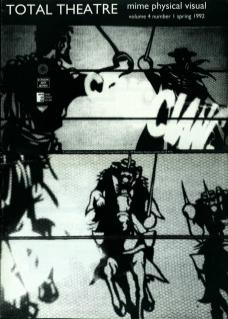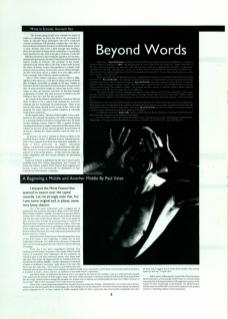The theatre going public may certainly be aware of mime as a dynamic artform, but what is the perception of mime in schools? Those performers who have conducted schools workshops will probably confirm that very little is known about it and most teachers would hardly know where to start. Besides, they have a hard enough time finding a place for any kind of drama in the curriculum. It is probably more pertinent to ask: what is the place of drama in schools?
With the intention of answering this question, for teachers, parents and governors, the Arts Council has just launched its report, ‘Drama in Schools’. The purpose of the report, initiated by the drama officer, Sian Ede, is threefold: to raise the status of drama, to give clear guidance to schools, both primary and secondary, on how they can use drama throughout the curriculum and as a subject in its own right, and to foster stronger links with the theatre profession.
This is where mime companies come in. Mime is highlighted in the report as a vital part of drama and an element that is highly accessible to pupils of all ages. ‘Drama in Schools’ is the first document of its kind to give schools a clear idea of what should be taught at various age levels, or key stages as they are known, and how to develop feasible programmes of study. But what teachers are likely to be left asking is: how do I put this into practice?
As a result of the interest stimulated by ‘Drama in Schools’ there is likely to be a nationwide demand for in-service training and for workshops by professionals. There is no reason why mime should not be a part of this. Now is the moment for some vigorous public relations. It will help build future audiences.
As the report states, ‘Because drama makes a key contribution to the national curriculum, the skills of using drama as a learning method should be incorporated into all initial teacher training courses... [But] in 1988, a quarter of those teaching drama had no higher education qualifications in the subject. In the face of this national picture, the provision of in-service training for drama teachers must be seen as a priority...’
‘In practice, in-service training in drama is likely to be available from a variety of different sources. Schools may be able to buy support from their local education authority, or from a local university or higher education college... Professional companies and practitioners may also offer in-service sessions for teachers focusing on specialist aspects of work in the theatre... If they have the capacity, some companies will also accept teachers on placement schemes.
Drama in Schools is published by the Arts Council and is available from The Drama Department, Arts Council, 14 Great Peter Street, London SW1P 3NQ or from regional arts boards. Copies will automatically be distributed to Arts Council and RAB funded companies.

